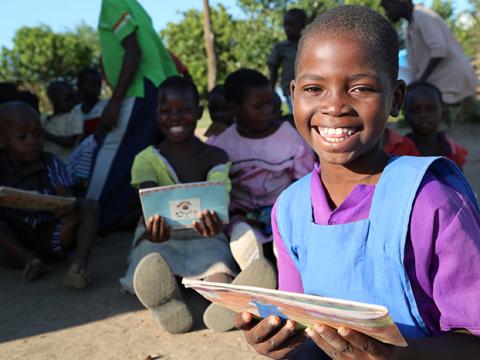Chimwemwe’s reading success encourages other students and inspires her community

Chimwemwe’s story
Martha is in grade 4. She is aged 12 and is new to her school. Her reading – even in Chichewa, Malawi’s national language – is not up to grade level. She can’t read in English at all.
Today Martha has been joined in her class by a young girl named Chimwemwe who, at only 8-years-old, can read the same books that Martha struggles with. The teacher brought her into the classroom so that her students can learn from Chimwemwe’s example. Chimwemwe’s excellent reading skills and top-of-class scores were noticed by the school’s administration. They promoted her from grade 3 to grade 4 as a test of her potential, and she’s thriving.
Chimwemwe attends a reading camp in her village in Malawi. Her teachers attribute her great leap in literacy skills as a direct result of access to multiple reading materials available at the reading camp. These locally-made stories and learning materials are created by community members using a simple publishing software. This tool – and the new books – were introduced through the Literacy Boost programme that World Vision is implementing in Chimwemwe’s village, and in other communinities in Malawi.
Creating books helps students learn and teachers teach
Attending a school that has an enrolment of over 2,500 children, compounded by a nearly non-functional school library, there were fears that like many students before her, Chimwemwe and her peers would not be able to learn to read, let alone write at their appropriate grade level.
In the past, even for those who attended the school regularly, the lack of reading materials slowed literacy skills development so students performed poorly at school, according to Head Teacher, John Mkandawire. “The school had no books, save for a few that we get from the ministry of education and they are not enough for all learners,” said John.
As teachers, we thought we just had to keep on working hard in the classrooms. We had no idea how we could turn around the learner’s potential and motivate them to get good grades.
Chimwemwe’s generation has come at a time when their community has embraced its role in their children’s education following a series of trainings on story writing and publishing with support from World Vision, giving hope to learners and teachers alike.
“As teachers, we thought we just had to keep on working hard in the classrooms. We had no idea how we could turn around the learner’s potential and motivate them to get good grades,” said John, adding that even teachers were frustrated with trying to teach a lesson with less than 10 books in a class and over 40 students.
While providing new teaching skills to the teachers through several teacher training sessions held across the community’s education zones, World Vision – through Literacy Boost – has also responded to proven research that providing children with a variety of reading materials in their local language contributes to their literacy development.
Fostering a love of reading in the community
It is through this approach that Chimwemwe has accomplished so much. As soon as reading camps and local books and learning materials were introduced, she became a frequent customer at the reading camp “book bank” which keeps and takes care of all books used at the camp.
“Chimwemwe fell in love with the new books,” said Margret, a reading camp volunteer. “Since they began producing the books, children have been very happy and they always borrow them so much that they often have no books in their library.”
Chimwemwe fell in love with the new books
Francis Maganga, one of the teachers at a neigbouring primary school, says that the coming in of the new locally-created books has complemented their resources and given learners something to be working on even when they are at home.
“We could never let the children borrow our books for the school since they are just too few,” he said. “And we are now happy that with the new books, this is not an issue. The more our learners are getting exposed to that literature, the more they are improving.”
This is only the beginning of Chimwemwe's story
Chimwemwe loves the story titled ‘Nkhuku yasochela’ (‘The Chicken has Gone Missing’ in English) that was authored by one of the community’s members who used to burn charcoal, hence used the new book creating software as a medium to communicate deforestration harms to the children.
Chimwemwe, 8, and her friend Patricia, 10, laugh as they read a story from one of their new locally created books. (Photo credit: Charles Kabena / World Vision)
“I love the pictures of Mr. Lyton and his wife making charcoal,” says Chimwemwe who has read the book five times along with many other titles. She added that the fact that the children read about people who they know and see in their daily life made the stories more lively and compelling.
Chimwemwe, who aspires to be a teacher, is among hundreds of children from her village who have participated in Literacy Boost as a gateway to academic excellence. Chimwemwe now has the opportunity to continue learning, reading and helping other students achieve academic success.
Related links
- Community literacy education in Burundi helps a grandmother teach her granddaughter to read
- Creating books, strengthening skills and inspiring imagination
- [VIDEO] Literacy Boost: Strengthening children's literacy skills in Burundi
_____________________________
Literacy Boost is a copywrited tool designed, developed and owned by Save the Children.